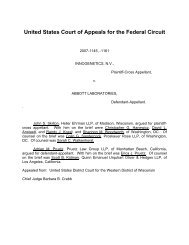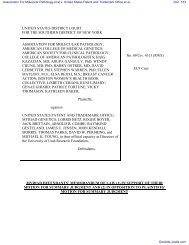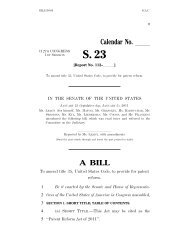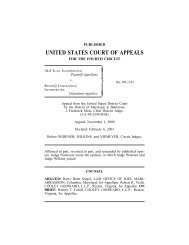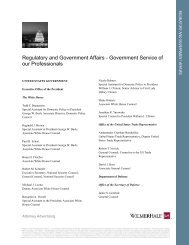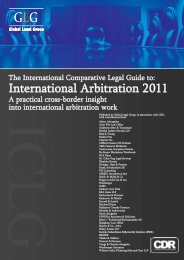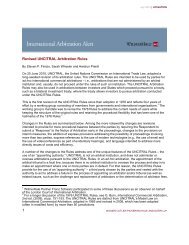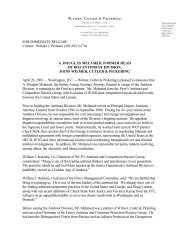2009 IPO Report - WilmerHale
2009 IPO Report - WilmerHale
2009 IPO Report - WilmerHale
- No tags were found...
You also want an ePaper? Increase the reach of your titles
YUMPU automatically turns print PDFs into web optimized ePapers that Google loves.
Takeover Defenses in <strong>IPO</strong> Companies13of the outstanding shares—commonly10% to 40%—to call special meetings.Companies that allow stockholders tocall special meetings, however, oftenauthorize the board to set the preciselocation and date of such meetingsand sometimes preclude stockholdersfrom calling for a special meetingclose in time to an annual meeting.Advance Notice RequirementsShould stockholders be required tonotify the company in advance ofdirector nominations or other mattersthat the stockholders would like to actupon at a stockholders’ meeting?Advance notice requirements providethat stockholders at a meeting mayonly consider and act upon directornominations or other proposals thathave been properly brought before themeeting. In order to be properly brought,a nomination or proposal must bespecified in the notice of meeting andmust be brought before the meetingby or at the direction of the board, orby a stockholder who has deliveredtimely written notice to the company.These provisions could have the effectof delaying until the next stockholdermeeting actions that are favored by theholders of a majority of the company’sstock. Investors generally do not object toadvance notice requirements, so long asthe advance notice period is not undulylong. Advance notice periods of 90 to 120days prior to the anniversary of the prioryear’s annual meeting date are common.State Anti-Takeover LawsShould the company opt out of anystate anti-takeover laws to which itis subject, such as Section 203 of theDelaware corporation statute?Section 203 prevents a publicly heldDelaware corporation from engagingin a “business combination” with any“interested stockholder” for three yearsfollowing the time that the person becamean interested stockholder, unless, amongother exceptions, the interested stockholderattained such status with the approval ofthe board. A business combination includesa merger or consolidation involvingthe interested stockholder and the saleThe following table sets forth the percentages of all <strong>IPO</strong> companies in 2007 and 2008 that adopted specifiedtypes of takeover defenses prior to or in conjunction with going public:Takeover Defenseof more than 10% of the company’s assets.In general, an interested stockholder isany entity or person beneficially owning15% or more of the company’s stock andany entity or person affiliated with orcontrolling, or controlled by, such entityor person. A public company incorporatedin Delaware is automatically subjectto Section 203 unless it opts out in itsoriginal corporate charter or pursuantto a subsequent charter or bylawamendment approved by stockholders.Blank Check Preferred StockShould the board be authorizedto designate the terms of series ofpreferred stock without obtainingstockholder approval?When “blank check” preferred stockis authorized, the board has the rightto issue shares of preferred stock in oneor more series without stockholderapproval under state corporate law, andhas the discretion to determine the rightsand preferences of each such series ofpreferred stock. Authorizing the boardto issue preferred stock and determineits rights and preferences has the effectof eliminating delays associated witha stockholder vote on specific issuances.Having blank check preferred stock inplace often facilitates the adoption of astockholder rights plan, financings andthe negotiation of strategic alliances.The issuance of preferred stock, however,can be used as an anti-takeover device.Stockholder Rights PlansPercentage of<strong>IPO</strong> CompaniesClassified board 60%Supermajority voting requirements to approve mergers or changecorporate charter and bylawsProhibition of stockholders’ right to act by written consent 69%Limitation of stockholders’ ability to call special meetings 74%Advance notice provisions 80%Section 203 of the Delaware corporation statute (chose not to opt out) 90%Blank check preferred stock 76%Stockholder rights plan (“poison pill”) 6%53%Should the company establish a poison pill?A stockholder rights plan, often referredto as a “poison pill,” is a contractual rightthat allows all stockholders—other thana stockholder who acquires more thana specified percentage of the company’sstock—to purchase additional securitiesof the company at a specified price. Ifsomeone triggers the rights plan, thatperson’s economic and voting power willbe significantly diluted. Supporters believerights plans are an important planningand strategic device because they givethe board time to evaluate unsolicitedoffers and to consider alternatives, andcan deter abusive acquisition techniquessuch as partial offers and “two-tier”tender offers. Opponents view rightsplans, which can generally be adoptedby board action at any time and withoutstockholder approval, as an entrenchmentdevice and believe that rights plansimproperly give the board, rather thanstockholders, the power to decide whetherand on what terms the company is to besold. When combined with a classifiedboard, rights plans make an unfriendlytakeover particularly difficult.





